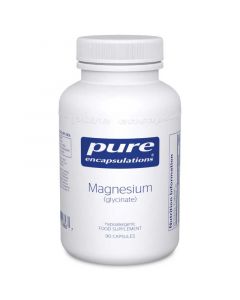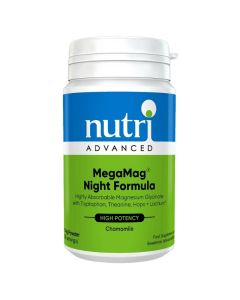
Which magnesium is best for sleep?
Quality sleep is essential for supporting our health as it supports cognitive function, enhances mood, and strengthens the immune system. It also plays a crucial role in maintaining physical health, improving memory, and increasing energy levels throughout the day.
People often struggle with sleep due to factors such as stress, anxiety, and poor sleep hygiene, which can disrupt the body's natural circadian rhythm. Additionally, lifestyle habits like excessive screen time before bed or an inconsistent sleep schedule can contribute to difficulties in achieving restful sleep. Medical conditions and certain medications can also impact sleep quality, making it harder to fall or stay asleep.
In this article we discuss the role of magnesium in supporting our sleep and explore which form of magnesium would help improve sleep the most.
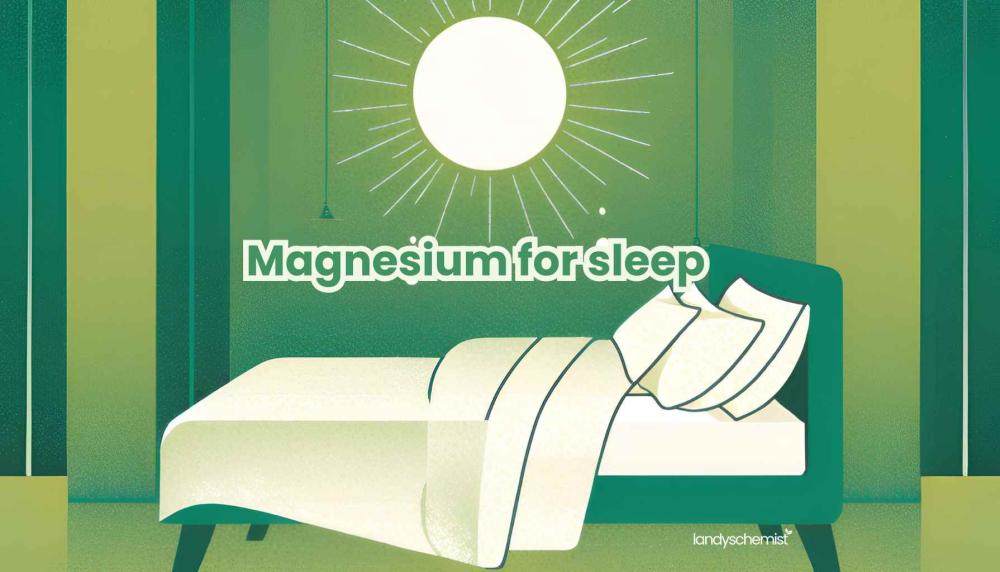
What is the best Magnesium for Sleep?
When it comes to choosing the best form of magnesium for sleep, the research tends to focus on general benefits, rather than recommending a specific form. That said, magnesium glycinate is commonly recommended due to its high absorption rate and calming effect on the nervous system, largely attributed to the presence of the amino acid glycine. This form is especially beneficial for individuals who experience digestive discomfort with other magnesium supplements. While magnesium glycinate is often suggested for sleep, many studies use more common forms like magnesium citrate, which has also shown to offer benefits for improving sleep. Although there’s a lack of studies directly comparing different forms, magnesium citrate is widely used and effective for supporting relaxation and improving sleep quality.
Read more: Benefits and Uses of Magnesium Glycinate
Can all types of magnesium help with sleep?
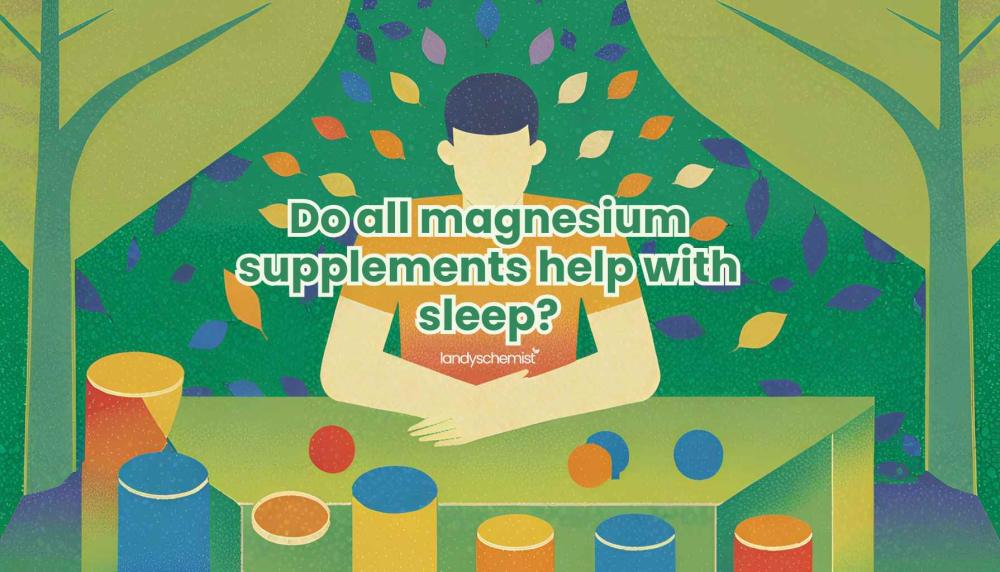
Yes, magnesium in any form can help promote sleep, as it plays a crucial role in supporting relaxation and healthy nerve function. However, while forms like magnesium citrate or malate also support sleep, the combination of magnesium and glycine in glycinate makes it particularly effective. A study showed that 3 grams of glycine before bedtime improved sleep quality and reduced the time it took to fall asleep.
Read more: Magnesium glycinate vs Magnesium Citrate: Which is better?
Common forms of magnesium used for sleep:
When considering magnesium supplements, it’s important to understand that there are various forms available, and each comes with its benefits:

- Magnesium Glycinate: Magnesium glycinate is known for its superior absorption and its calming effect on the nervous system, largely due to its combination with glycine. It’s often recommended for individuals seeking restful sleep, especially those who experience digestive discomfort with other forms of magnesium.
- Magnesium Citrate: Magnesium citrate is one of the most common and widely used forms of magnesium supplements. It’s often used for improving digestion and treating constipation, but it also offers sleep benefits. While not as targeted for sleep as magnesium glycinate, magnesium citrate can still be effective in supporting relaxation and improving sleep quality.
- Magnesium Oxide: Magnesium oxide is a highly concentrated form of magnesium, but it has lower bioavailability compared to magnesium glycinate or citrate. While it’s often used to treat magnesium deficiency, it’s not as commonly recommended specifically for sleep.
- Magnesium L-Threonate: Magnesium L-threonate is a newer form of magnesium that has garnered attention for its potential cognitive benefits, including improving memory and sleep. It’s believed to cross the blood-brain barrier more effectively, making it a good option for those looking to enhance sleep quality and cognitive function.
- Magnesium Malate: Magnesium malate is often used for muscle relaxation and improving energy. While it’s not typically targeted for sleep, it can help alleviate tension and discomfort that might interfere with restful sleep.
Shop our full range of Magnesium supplements here
Best time to take magnesium for sleep
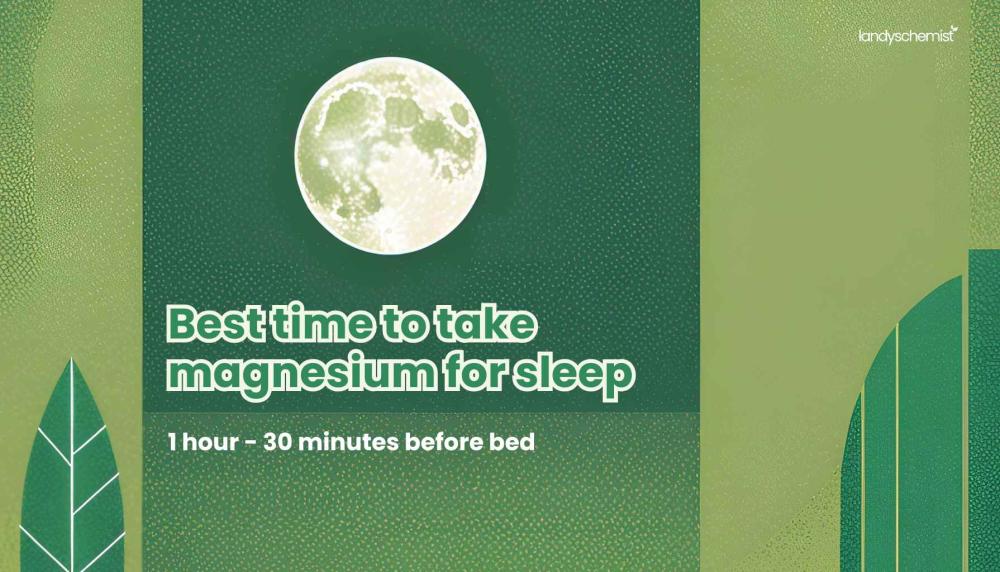
The best time to take magnesium for sleep is about 30 minutes to an hour before bedtime, with a typical dosage of 200-400 mg to help promote relaxation and support restful sleep.
Read more: How to make the ‘sleepy girl mocktail’
Is it Safe to Take Magnesium Every Night for Sleep?
Yes! Magnesium is an essential mineral that your body requires daily. The body uses magnesium for processes like protein synthesis, muscle and nerve function, blood glucose control, and blood pressure regulation. Therefore, taking magnesium glycinate daily can help maintain healthy sleep cycles, reduce anxiety, and even improve muscle recovery.
Recommended magnesium supplements for sleep

Pure Encapsulations Magnesium (Glycinate) Capsules
- Highly bioavailable and well-tolerated for enhanced absorption
- Provides 120 mg of magnesium per capsule, with a flexible 1-4 capsule daily dosage to suit individual needs
Nutri Advanced MegaMag Night Formula Powder
- Comprehensive sleep-support formula combining magnesium with calming botanicals and amino acids
- Designed for easy absorption in a powdered form that mixes well with water for a convenient bedtime drink
- Includes additional sleep-enhancing ingredients like hops, L-tryptophan, Lactium®, and L-theanine to further support relaxation and a healthy sleep cycle.
FAQ’s
What is the difference between magnesium glycinate and magnesium bisgylcinate?
Magnesium glycinate and magnesium bisglycinate are the same compound. The term "bis" indicates that two glycine molecules are attached to one magnesium ion. Therefore, both names refer to the same form of magnesium supplement. Read in more detail: Magnesium glycinate vs Bisgylcinate
What are the benefits of magnesium for sleep?
Magnesium helps relax muscles, calm the nervous system, and regulate sleep hormones, which can lead to improved sleep quality and reduced insomnia.
Which magnesium form is easiest on the stomach?
Magnesium glycinate is generally considered the gentlest on the stomach, making it a good option for those with sensitive digestive systems.
Can magnesium citrate help with insomnia?
Yes, magnesium citrate can help with sleep quality, though magnesium glycinate is often preferred for sleep due to its calming effects from glycine.
Is it safe to combine magnesium glycinate with other sleep aids?
Yes, combining magnesium glycinate with other sleep aids or herbal supplements, can be effective for some people.
References:
- https://esmed.org/MRA/mra/article/view/5410
- https://onlinelibrary.wiley.com/doi/full/10.1111/j.1479-8425.2007.00262.x
- https://onlinelibrary.wiley.com/doi/abs/10.1111/j.1479-8425.2006.00193.x
Disclaimer: This article is for informational purposes only and is not a substitute for medical advice. Consult your doctor or healthcare provider before starting any supplements, treatments, or remedies. Ensure a varied and balanced diet and a healthy lifestyle before considering supplements. Supplements should not replace a balanced diet.

